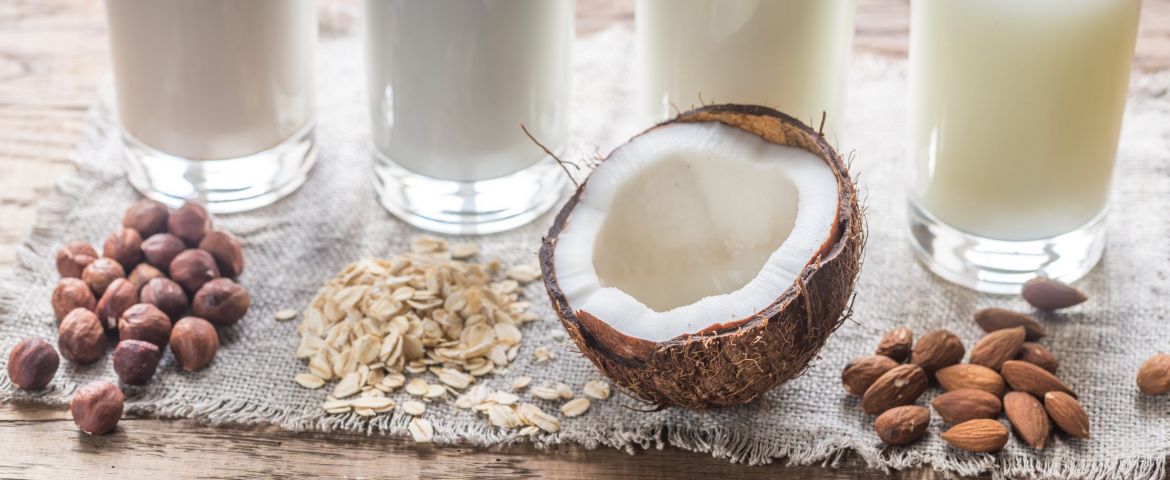By: Sophia Speroff
Milk has been a staple drink in households for a long time. According to the U.S. Department of Agriculture, the average person consumes 18 gallons a year! However, that’s down from 30 gallons a year in the 1970’s. Why is this? There are many different reasons — from moving from farms to cities, getting vitamins and minerals from other sources and an increase in the non-dairy alternatives for milk.
What is drawing people to non-dairy alternatives? Some may have an allergy to milk or are lactose intolerant. Others follow a vegan lifestyle, which excludes all products that come from animals. Some may be looking for a healthier option lower in fat or calories.
There are many kinds of milk alternatives — let’s explore the different options out there so you can make the most educated choice for yourself.
Soymilk
This is a close comparison to cow’s milk. Soybeans are an excellent source of complete protein. An 8 oz. serving of soymilk provides about 105 calories, 6 grams of protein and 4 grams of fat. It also has vitamin B12 and D, calcium and phosphorus. This is a great way to replace milk in cooking.
Almond milk
This is made from whole almonds, or almond butter and water. Almond milk is a lower calorie option coming in at 40 calories in an 8 oz. glass. However, it also supplies a little less protein and fat as well (1.5 grams of protein and 3.58 grams of fat). This option has a little sweeter taste and can be great for baking or smoothies!
Coconut milk
This is made from water and the white flesh of brown coconuts — and has a creamy, sweet taste. The downside with this milk substitute is that it contains zero protein. Coconut milk has about 45 calories for an 8 oz. cup with 4 grams of fat.
Oat milk
This alternative is made with oats and water. It’s higher in carbohydrates from the oats, and also contains a high amount of soluble fiber – which can help lower cholesterol levels. An 8 oz. glass contains 130 calories, 2 grams of fat, and 4 grams of protein.
Rice milk
Made from milled white or brown rice and water — this is a safe option for those who have a allergies or intolerances to dairy, gluten, soy or nuts. The FDA recommends that people consume rice as a part of a balanced diet and not in excess because rice is found to contain arsenic — a toxic chemical found naturally in the environment. If consumed in high amounts, rice can be associated with various health problems. An 8 oz. glass of rice milk contains 135 calories, 2-3 grams of fat and 1 gram of protein.
Cashew milk
Made from a mixture of cashew nuts or cashew butter and water — cashew milk is sweet, creamy and a little thicker. One downfall of it: it’s lower in protein – coming in at around 0-1 gram of protein in an 8 oz. glass and 2-4 grams of fat.
Macadamia milk
This is a newer variety and is made of mostly water and about 3% macadamia nuts. It has a rich, smooth, creamy texture. One benefit of this milk substitute is that it’s a good source of monosaturated fats — increasing your intake in these “good fats” can help lower your blood cholesterol levels, blood pressure and your risk of heart disease. This substitute contains about 50-55 calories, 4.5 grams of fat and 1-5 grams of protein in an 8 oz. glass.
Hemp milk
This is made from the seeds of the hemp plant — cannabis sativa. Hemp seeds only contain trace amounts THC (the same chemical in marijuana). Hemp milk is thin, watery and has a slightly sweet taste to it. It’s a great source of complete protein that contains all the essential amino acids and it has omega 3’s and 6’s – these are something your body cannot make! Hemp milk comes in around 60-80 calories, 4.5-8 grams of fat and 2-3 grams of protein per 8 oz. glass.
Quinoa milk
This milk alternative is made from quinoa — an edible seed that is prepared and consumed as a grain — and water. It has 111 calories, 1.6 grams of fat and 3.8 grams of protein — making it well-balanced compared to other dairy milk substitutes.
A couple things to note when looking for the right milk alternative for you — watch for added sugars, look at the calcium and vitamin B12 amount and try to get one fortified with B12 — something cow’s milk has a lot of. Furthermore, always look at the ingredients to make sure it is safe for you to consume — especially if you have any allergies.
The bottom line – do your research and take the time to find what option is going to be best for you!
About the Author: Sophia Speroff is an eager & passionate Registered Dietitian with 8 years of experience educating patients & a MPH graduate ready to plan nutrition programs to assist in the promotion of health & control disease.


